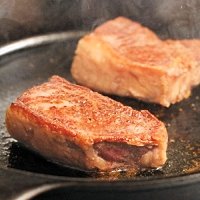
|
Some Common Myths Thought to be True - Myth 21
Myth 21: Searing Meat is used to "seal in" Moisture
Searing meat does not "seal in" moisture, and in fact may actually cause meat
to lose moisture. Generally, the value in searing meat is that it creates a
brown crust with a rich flavor via the Maillard reaction.
For years, the idea that searing meat helped prevent moisture loss was a
cherished and oft-cited piece of culinary doctrine. It made sense and seemed
consistent with people's experiences, so it was accepted, largely unquestioned,
for nearly a century.
In recent years, however, the pendulum has swung the other way, with large
numbers of people now declaring the theory to be pure nonsense - a humor12-myth, like
fairies or leprechauns. It's been "debunked," they say, by "science."
|
|
But with meat we're about to braise, we don't care about "sealing in" juices.
Properly braised meat is going to be moist and juicy no matter what. Searing
before braising is done for reasons of appearance and flavor only.
As such, we're not concerned here with searing as it relates to the browning of
meat prior to braising. For the purposes of this discussion, "searing" refers
to the act of quickly browning a steak or other tender cut of meat, over a very
high (i.e., 450°F or higher) heat, sometimes using a small amount of fat, as a
part of a cooking procedure that uses dry-heat methods exclusively.
|
